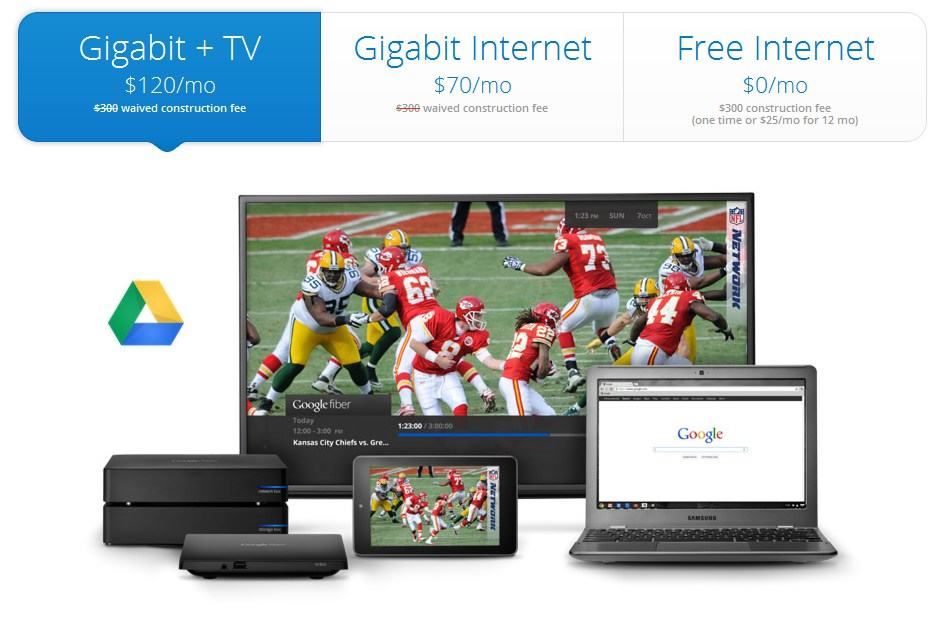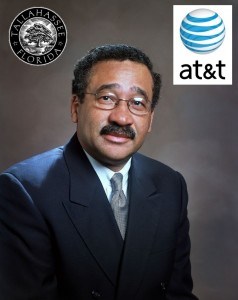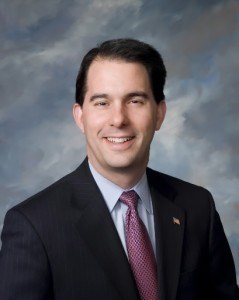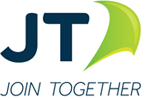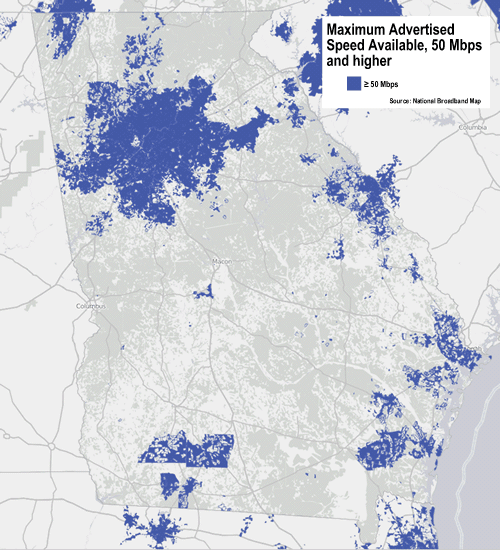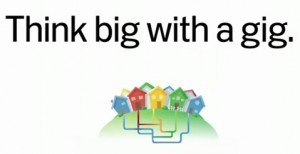 Believe it or not, Google Fiber has not always been headline news in Kansas City. Outside of a few stories in early spring about zoning and installation matters, local media (particularly television) has mostly given back page treatment to Google’s new fiber network since the city was first chosen in March, 2011.
Believe it or not, Google Fiber has not always been headline news in Kansas City. Outside of a few stories in early spring about zoning and installation matters, local media (particularly television) has mostly given back page treatment to Google’s new fiber network since the city was first chosen in March, 2011.
That all changed last Thursday when television, radio, and newspaper reporters flooded a converted yoga studio in midtown Kansas City to attend Google Fiber’s unveiling. Many stations aired live reports on-site and devoted time during their afternoon and evening newscasts to explain what the service is all about, starting with what it will cost — $70 a month for 1Gbps service (or paying a flat $300 for 5/1Mbps service for the next seven years). Adding television brings the final price to $120 a month. Google considers landline phone service a dead-end business, and won’t bundle a telephone option, but customers can use Google Voice to make and receive most calls for free.
[flv width=”640″ height=”380″]http://www.phillipdampier.com/video/KMBC Kansas City Google announces details of Google Fiber service 7-26-12.flv[/flv]
KMBC reports on the introduction of Google Fiber, what it will cost Kansas City residents, what it means for the city as whole, and when and how service will be installed. (3 minutes)
Kansas City, Mo., Mayor Sly James said Google Fiber was more of an opportunity than a gift for Kansas City.
“We now have an opportunity to take a giant step and if we don’t it’s all on us,” James said.
KCUR Radio in Kansas City explores some of the public policy and institutional changes Google Fiber can bring the area with the advent of gigabit broadband. Mike Burke, Missouri co-chair, and Dr. Ray Daniels, Kansas co-chair of the Mayors’ Bistate Innovation Team talks about what changes Google Fiber could bring to health care, education, government, and more. The Mayors’ Bistate Innovation Team recently released a report titled “Playing to Win in America’s Digital Crossroads,” a playbook for capitalizing on ultra-high-speed fiber in Kansas City, Kansas and Kansas City, Missouri. (Some of the specific details discussed in the program turned out to be outdated after last Thursday’s announcement introducing the service.) (June 6, 2012) (52 minutes)
You must remain on this page to hear the clip, or you can download the clip and listen later.
Some in the media seemed disappointed Google spent a considerable amount of time selling the entertainment-oriented element of its service — namely the television lineup and the equipment that comes with it, and less on the educational and transformational nature of gigabit broadband. But many in the audience didn’t need an explanation of what 1,000/1,000Mbps service will mean for them.
Reviewing the coverage shows a predictable response:
- Those under 30 want it today and won’t think twice about paying $70 to get it;
- Those running businesses that depend on the web also want it, and are slightly perturbed Google will only sell to residential customers at first;
- Families with young children want the service because they feel it will be a game-changer for their children’s education and future career;
- Income-challenged residents are concerned about the cost, but are happy to discover Google has an affordable option for them to participate in the wired world;
- Older residents seem preoccupied with the price and consider the television lineup even more important than broadband speed;
- Schools, libraries, health care, and non-profit groups are thrilled with the prospect of getting free or deeply discounted service;
- Incumbent providers are putting on a brave face, relying on what they feel is excellent customer service, local ties to the communities they service, and a current customer base that may be reluctant to switch.
[flv width=”640″ height=”380″]http://www.phillipdampier.com/video/KCTV Kansas City Introducing Google Fiber 7-26-12.mp4[/flv]
Google Fiber has arrived in Kansas City, and neighborhoods will compete to see who gets the gigabit broadband service first. KCTV in Kansas City reports. (3 minutes)
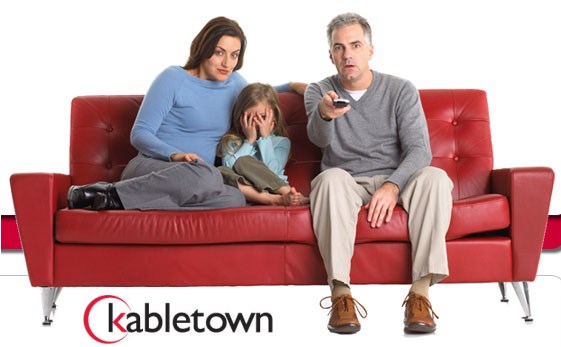
Google Fiber’s free 5/1Mbps service is another embarrassment to big cable companies like Comcast which offer less service for more money.
The Kansas City Star needlessly fretted about the remaining digital divide of Internet “have’s” and “have-not’s,” as Google launched a competition between neighborhoods to determine where to install the service first.
So far, many poorer urban core neighborhoods are expressing interest in Google fiber at a slower rate than middle- and higher-income neighborhoods.
It’s important now for efforts to reach out to help the lower-income neighborhoods rally so the access doesn’t become a new dividing line.
The newspaper is concerned by Google’s fiber map showing many minority, inner-city neighborhoods have yet to receive a single commitment from a resident willing to pre-register for the service. But Google is not running a competition to exclude anyone. It is surveying interest to ensure it has a working business model to sustain its fiber broadband operation. Overshadowed by the gigabit broadband announcement is the fact Google is also including a real solution for the income-challenged — an entry-level 5/1Mbps broadband option that will cost just $300 (payable in $25 installments) that guarantees service with no additional payment for seven years.
That is a broadband solution far superior to the afterthought programs on offer from Comcast and a handful of phone companies that only deliver a fraction of the speed, at a higher price, to those who meet a byzantine set of requirements. It is yet another embarrassment for Kabletown, which would not have even offered the service had the government not made it a condition for approving the mega-merger of NBC-Universal and Comcast.
[flv width=”640″ height=”380″]http://www.phillipdampier.com/video/KCTV Kansas City Neighborhoods Compete for Fiber 7-26-12.flv[/flv]
KCTV visits some of the neighborhoods competing to be the first to get Google Fiber. Reaction from residents varies from those willing to canvas neighborhoods to get people to pre-register to others who will consider switching providers only if the price is right. (4 minutes)
One Star columnist likened Google Fiber to a public works project that threatened to go bad pitting neighborhoods against one-another, rich against poor:
The more educated, middle- to upper-income neighborhoods in southwest KC and in midtown were signing up for first crack at the service.
Meanwhile, the neighborhoods without as many computers and without the income to afford the $70 or $120 proposed monthly charges for Google Fiber were signing up at far slower rates.
None of that means Google Fiber won’t be a big success.
But let’s not pretend there won’t be winners and losers with this advance in technology.
If Google Fiber narrows that digital gap – and makes more information available more quickly to more people to help boost the economy of KC – that’s all for the good.
However, being able to hook up eight computers in a house so people can be more entertained doesn’t set my world on fire.
Let’s remember Google Fiber is intended to be a for-profit business run by a for-profit corporation. Star columnist Yael T. Abouhalkah might have been more comfortable had he advocated for a community-owned broadband solution committed to serving every neighborhood, everywhere. Google Fiber is not that, at least not now. The alternatives from AT&T and Time Warner Cable have not solved the digital divide either. Giving away effectively-free 5/1Mbps broadband for seven years might.
[flv width=”640″ height=”380″]http://www.phillipdampier.com/video/KCTV Kansas City Fiberhoods 7-26-12.mp4[/flv]
Google’s Fiberhoods are likely to win fiber service for the more high-tech areas of Kansas City, among the first to pre-register. Google’s Kevin Lo explains those areas most committed to getting the service will also win free fiber connections for their neighborhood’s schools, health care facilities, and public safety buildings. KCTV reports. (3 minutes)
[flv width=”640″ height=”380″]http://www.phillipdampier.com/video/KCTV Kansas City Benefits of Google Fiber 7-26-12.mp4[/flv]
KCTV explores what Google Fiber could mean for local schools who can utilize the faster connections for distance and remote learning. (3 minutes)
[flv width=”640″ height=”380″]http://www.phillipdampier.com/video/WDAF Kansas City Customers Put Google Fiber to the Test 7-28-12.flv[/flv]
WDAF in Kansas City covers Google Fiber’s weekend “Open House,” inviting residents to experience what gigabit broadband is really like, and letting them see and sample the company’s broadband and television service. (2 minutes)
[flv width=”480″ height=”380″]http://www.phillipdampier.com/video/KSHB Kansas City Northland business owners react to Google Fiber limitations 7-26-12.mp4[/flv]
KSHB in Kansas City covers the reaction of local business owners elated and frustrated by the arrival of Google Fiber, which will open the door to new online innovation once Google begins selling to commercial customers (and if you are lucky enough to work in a Google Fiberhood.) (2 minutes)


 Subscribe
Subscribe